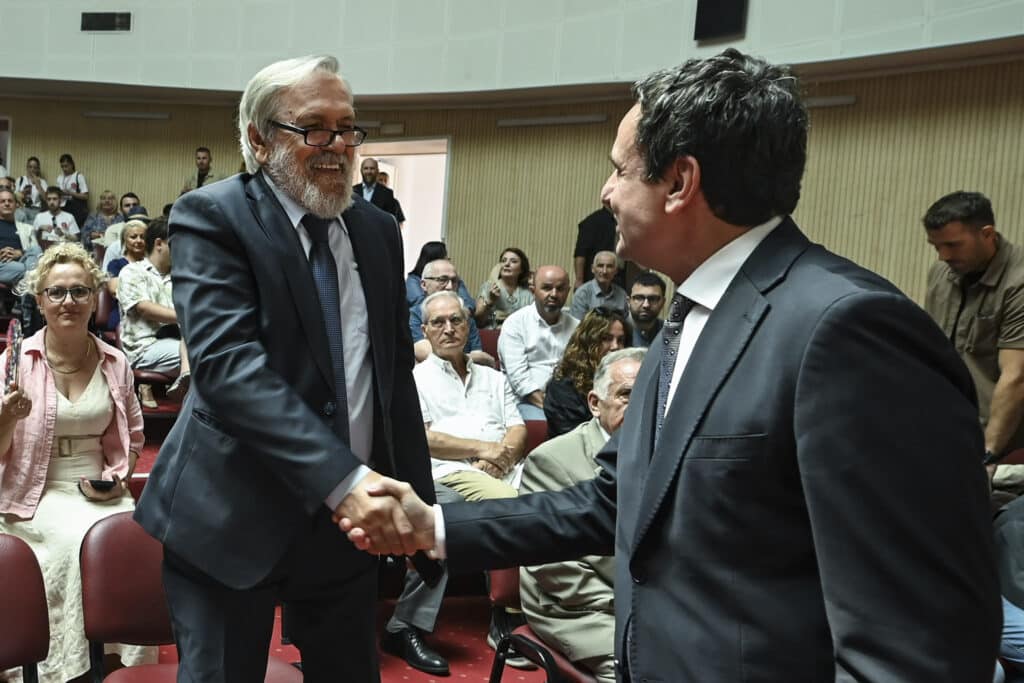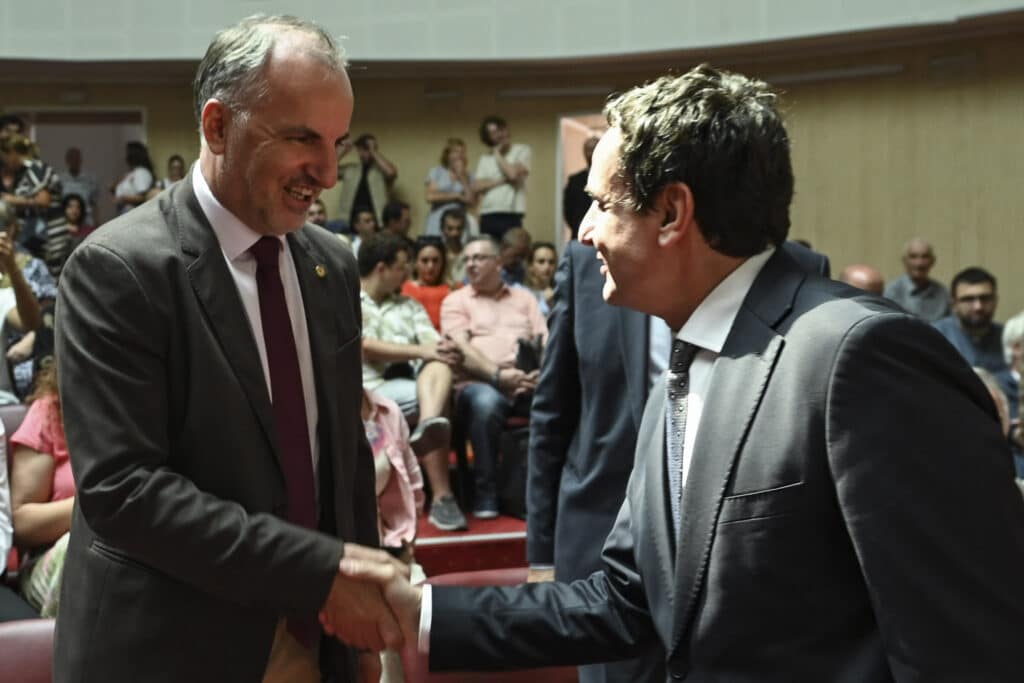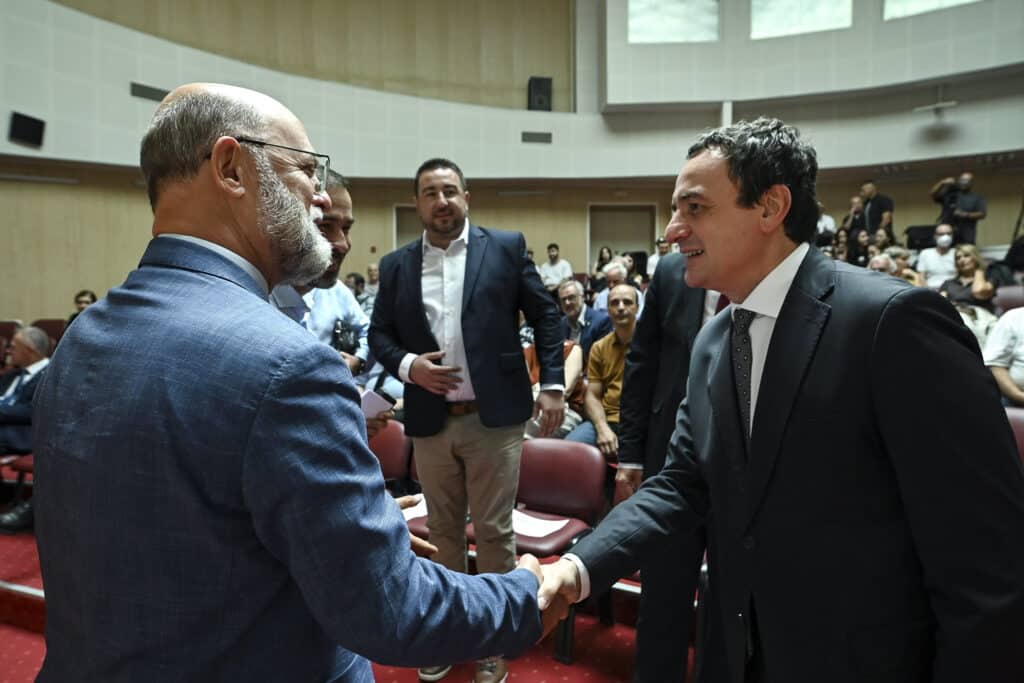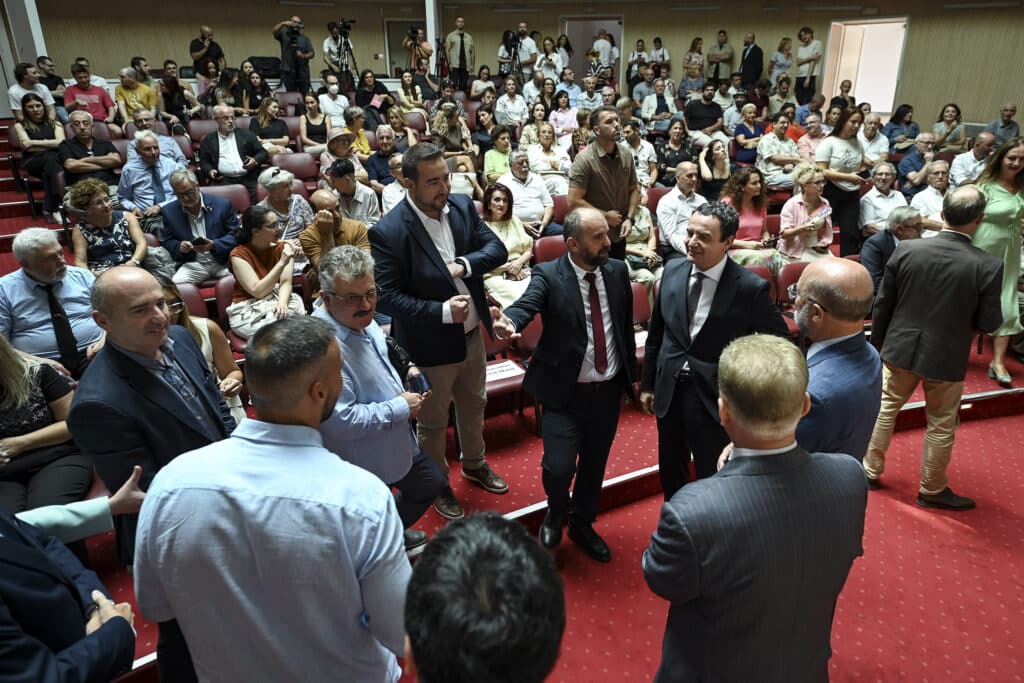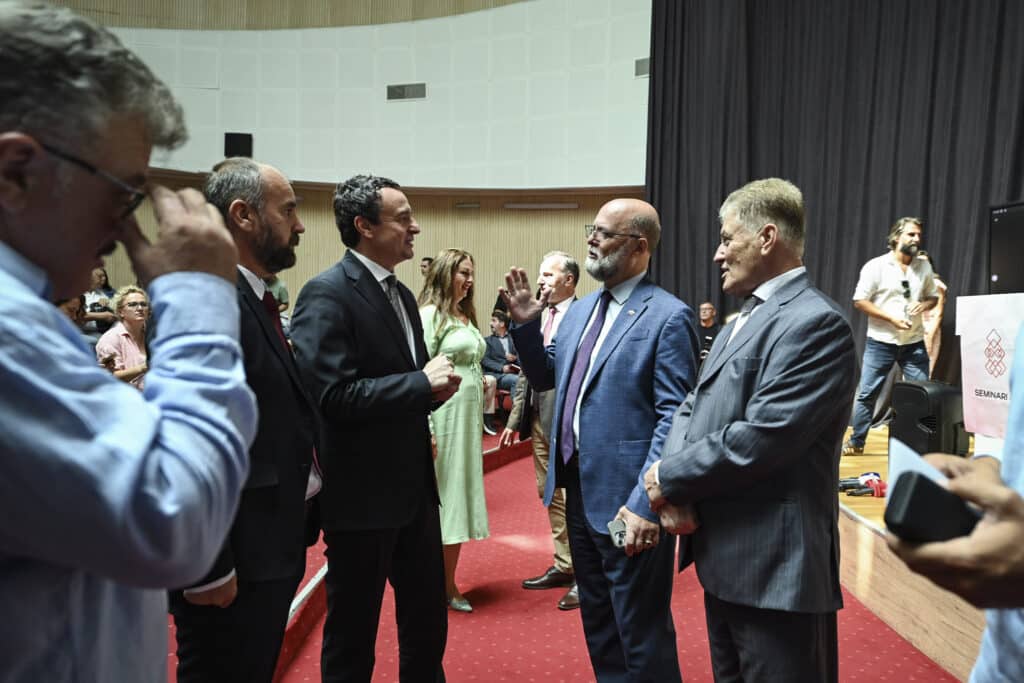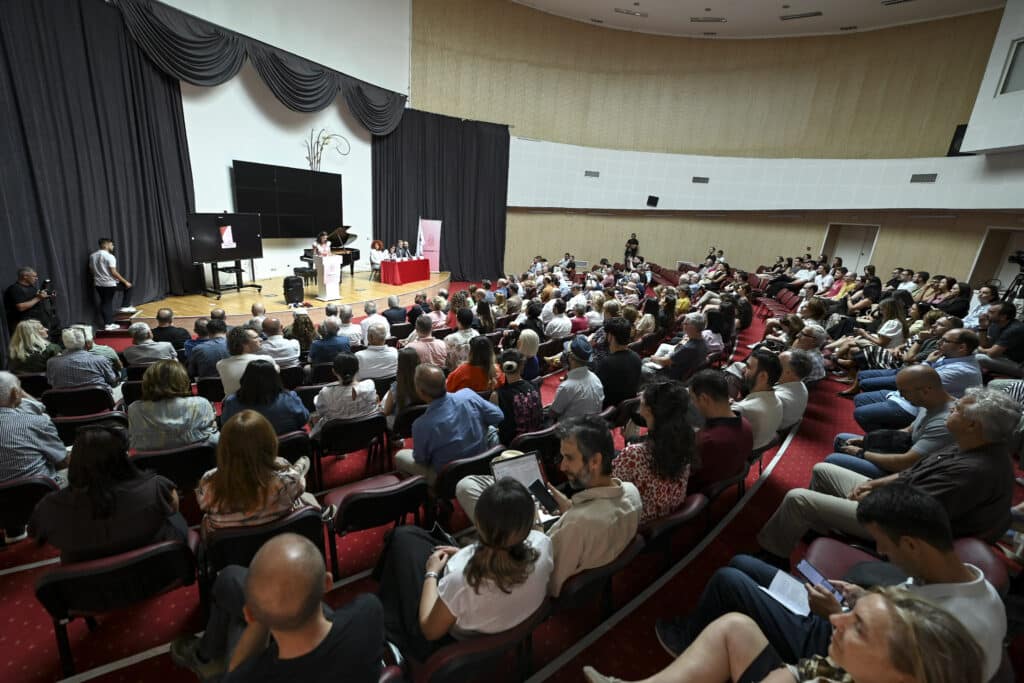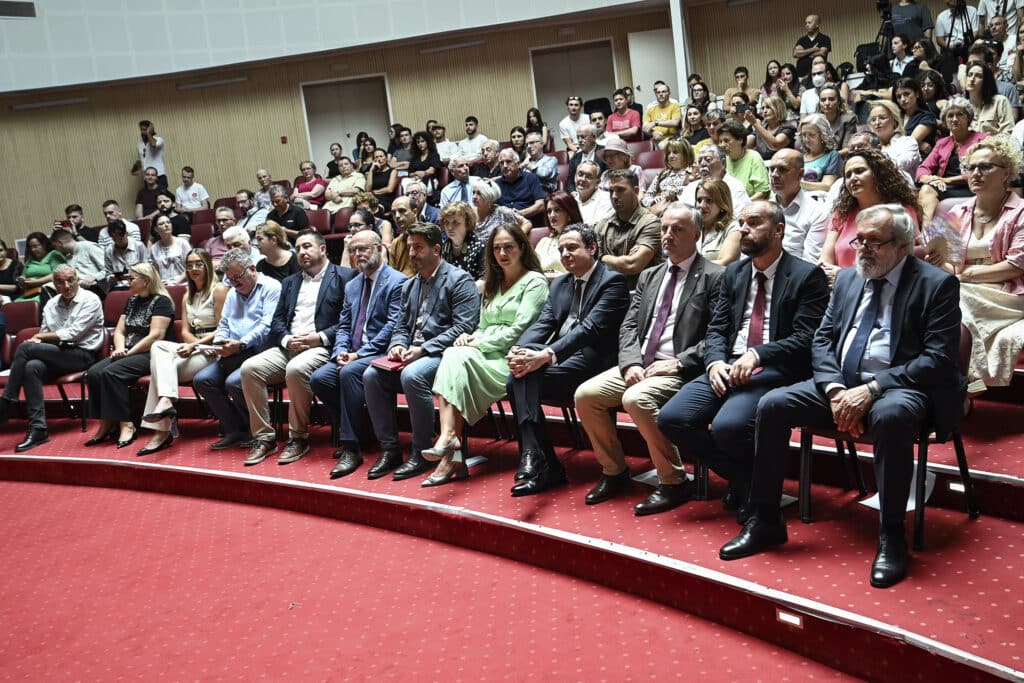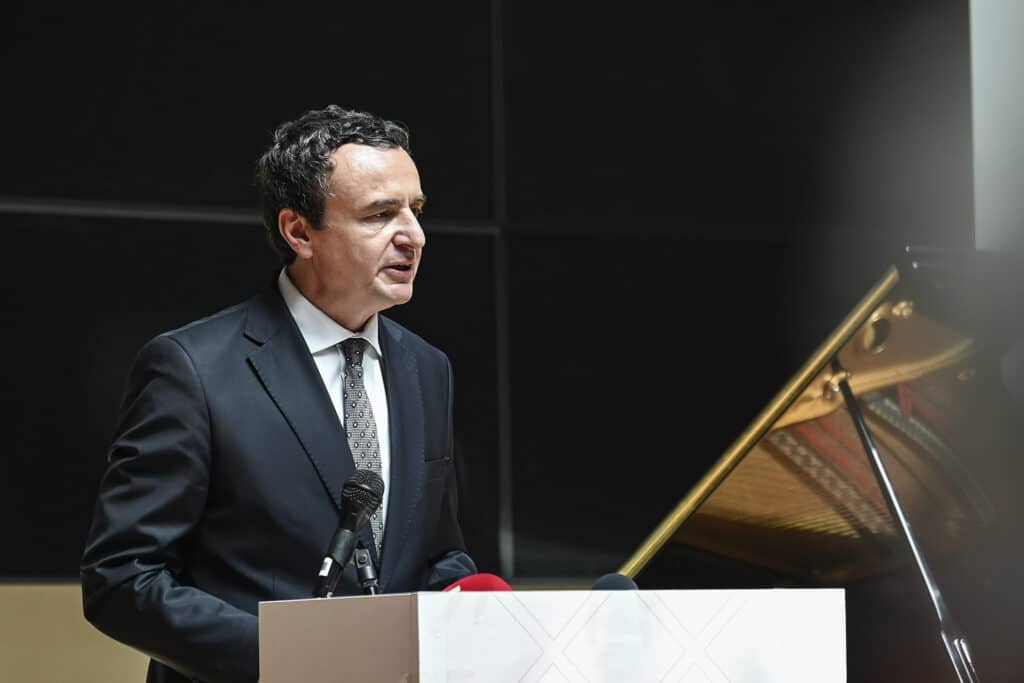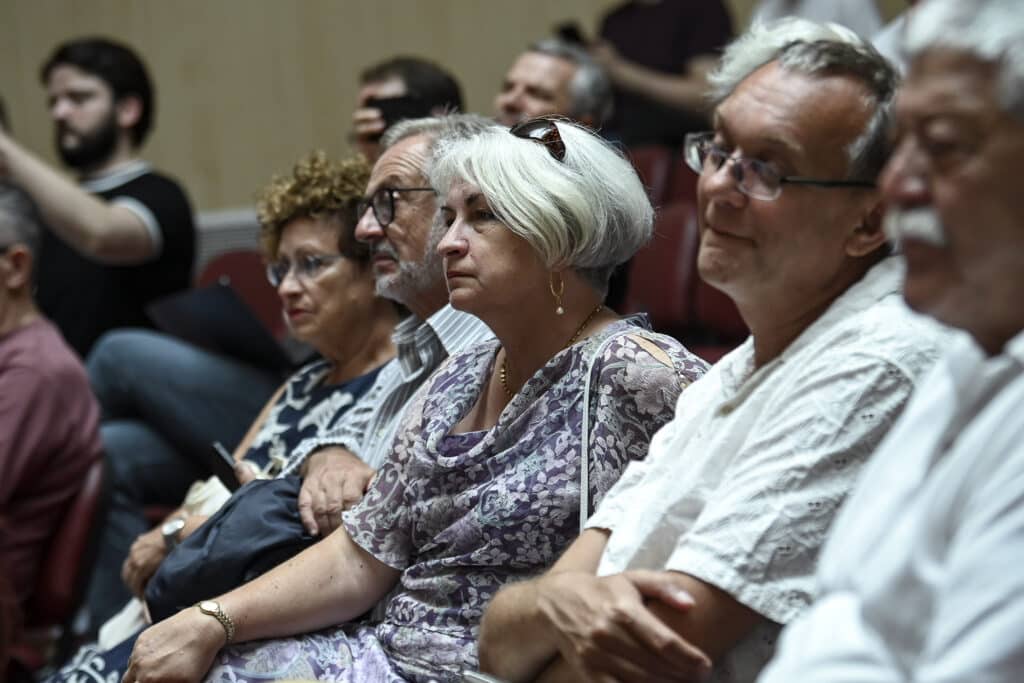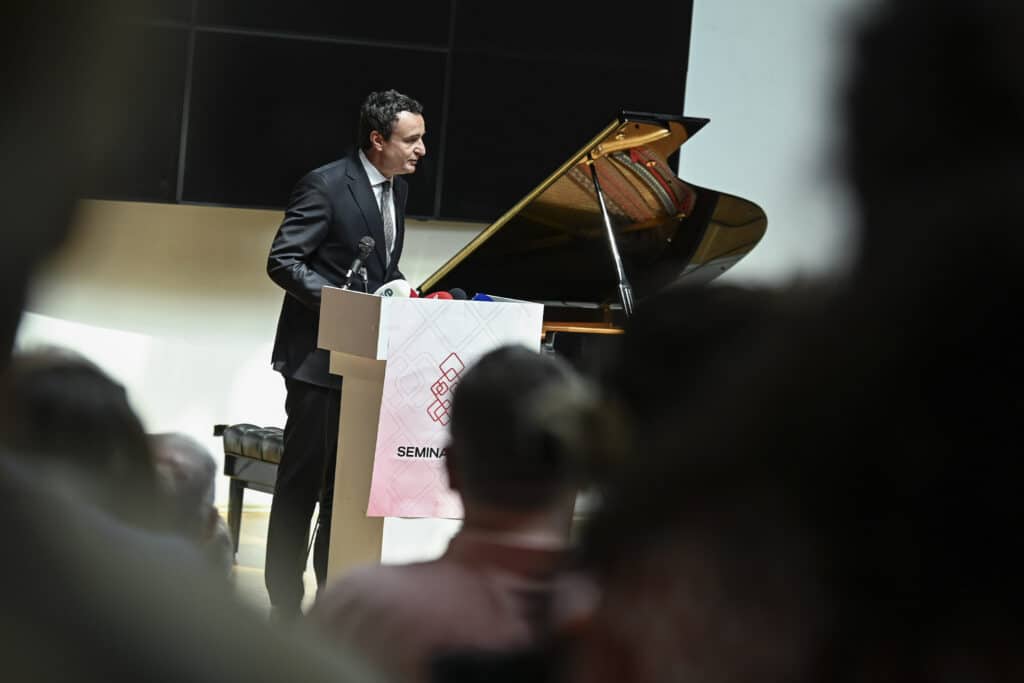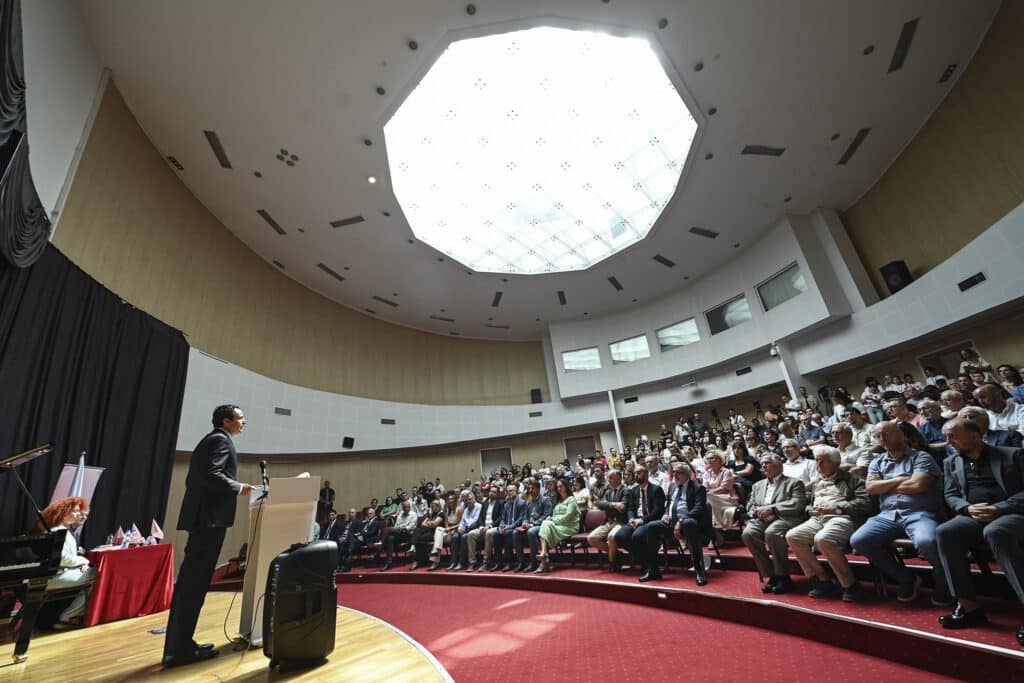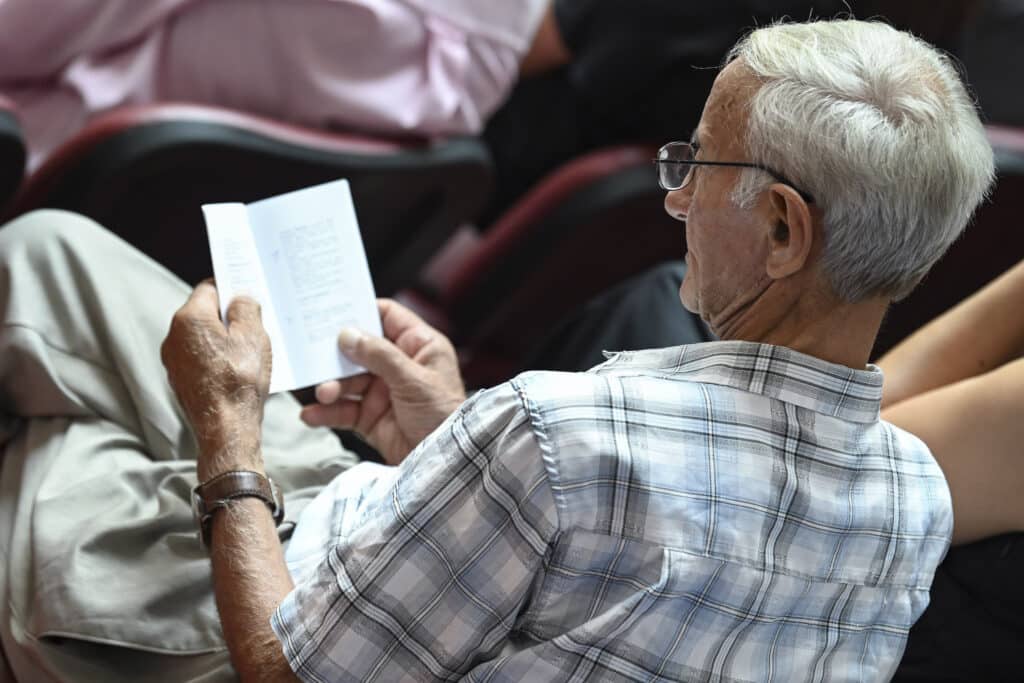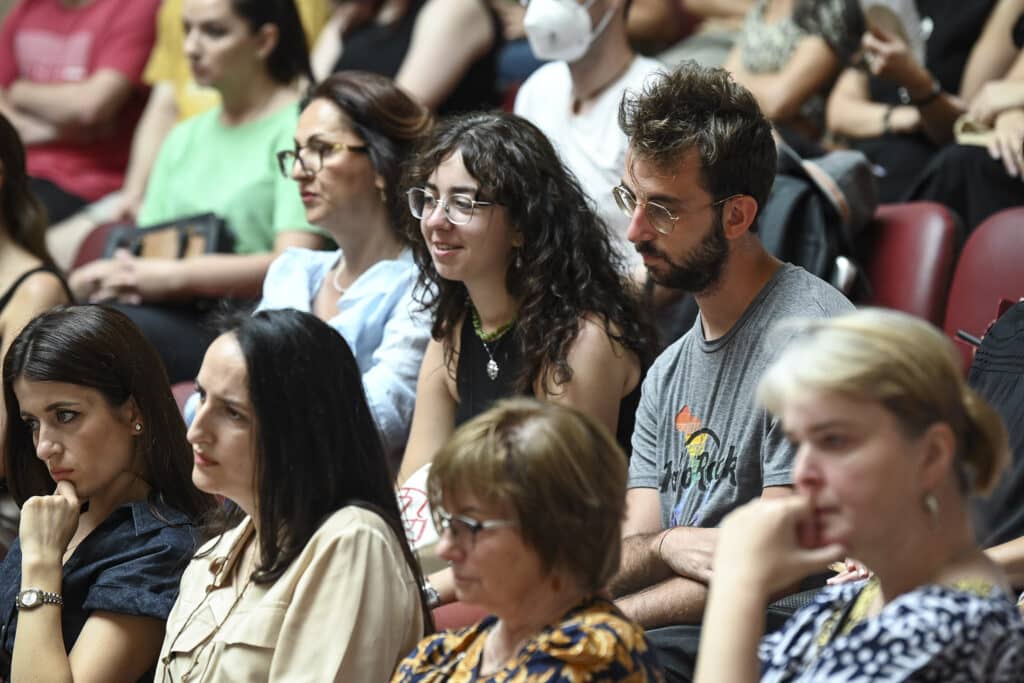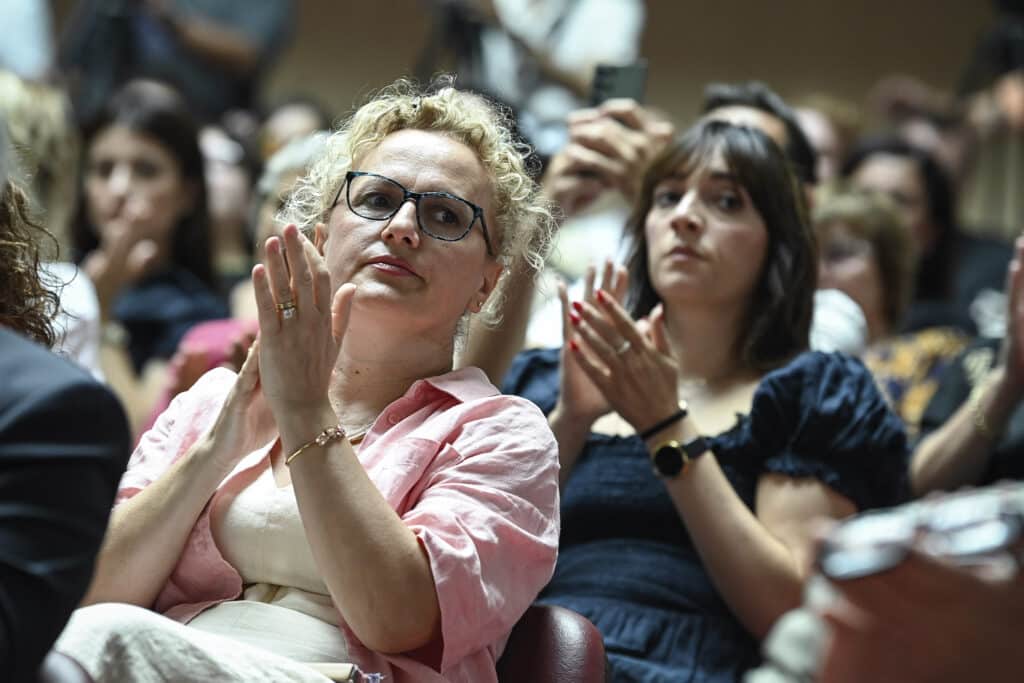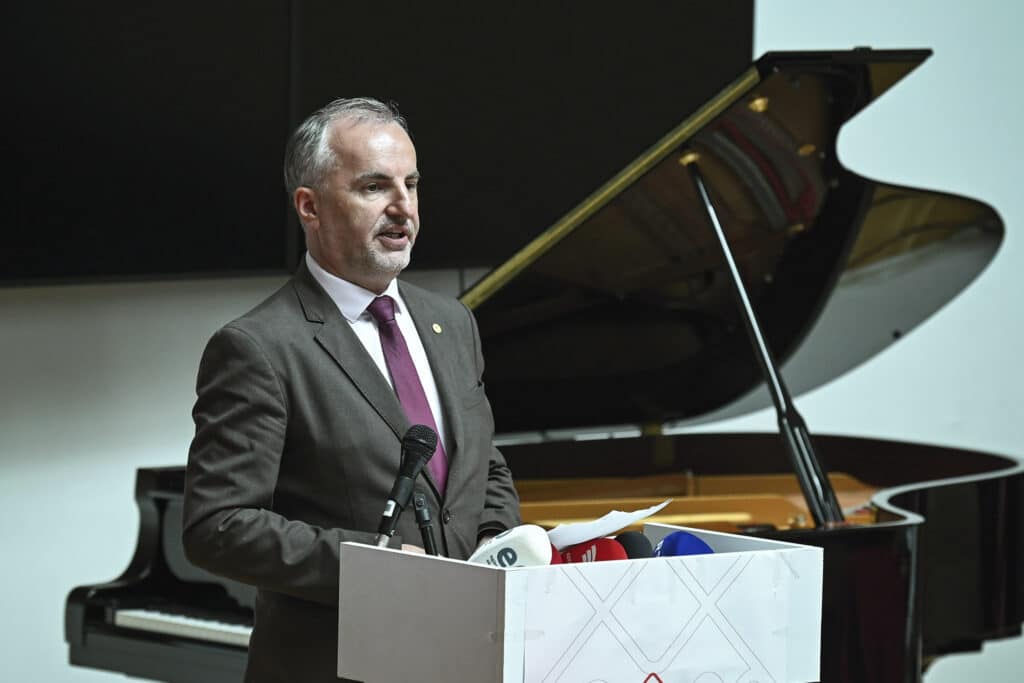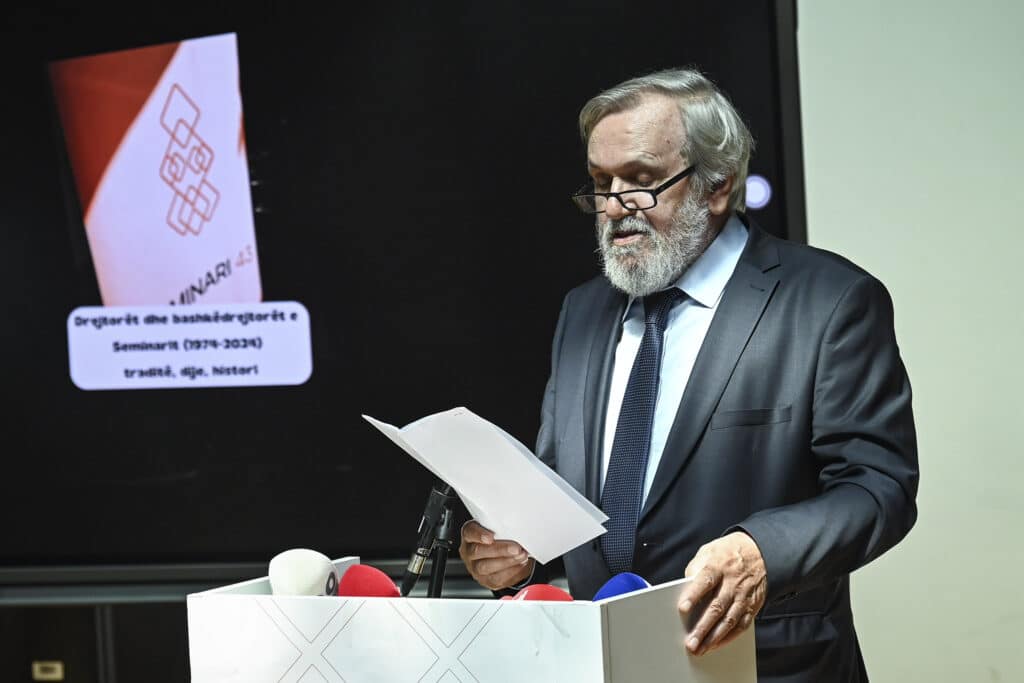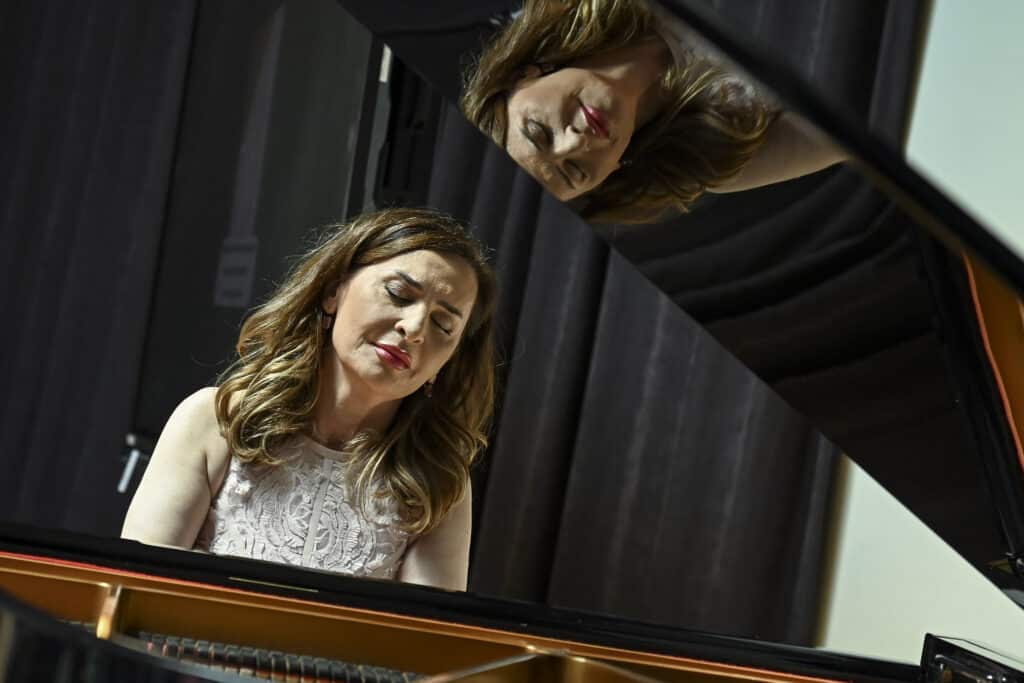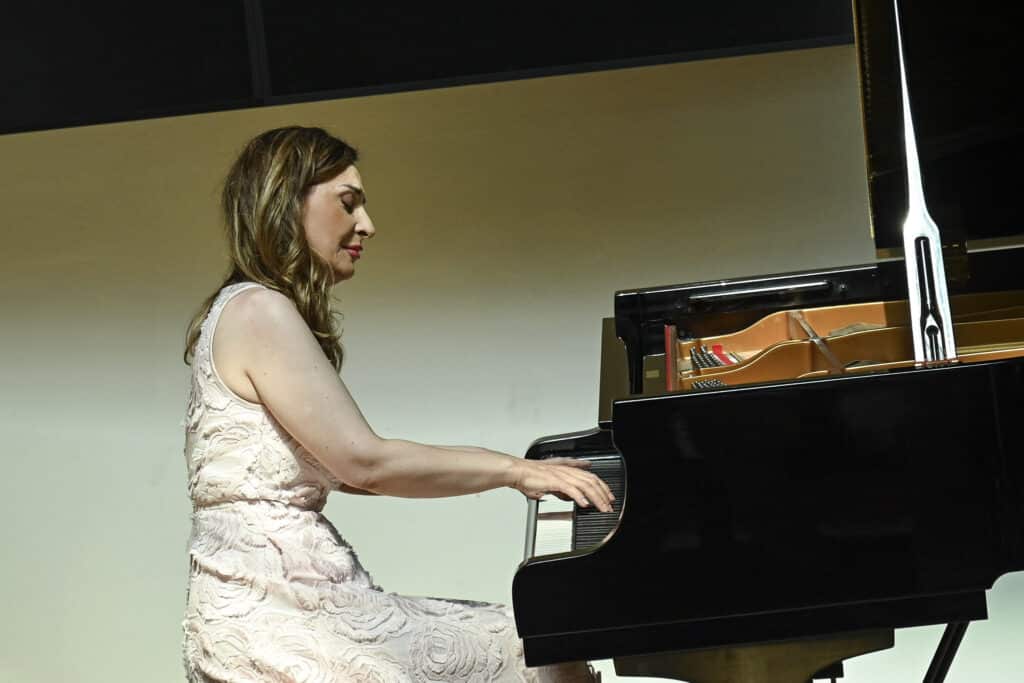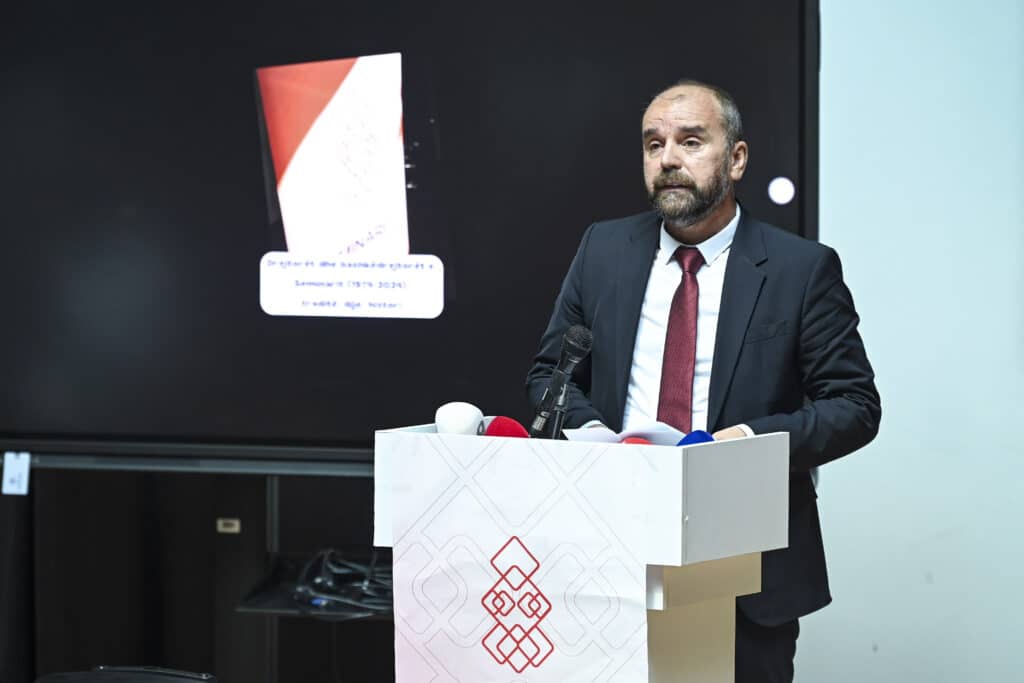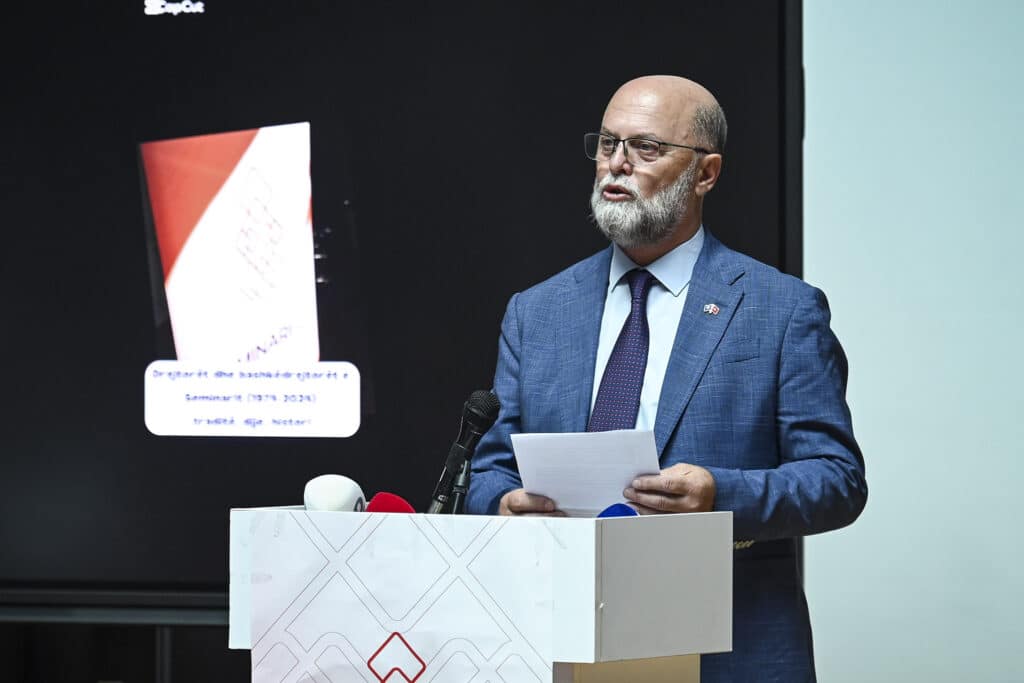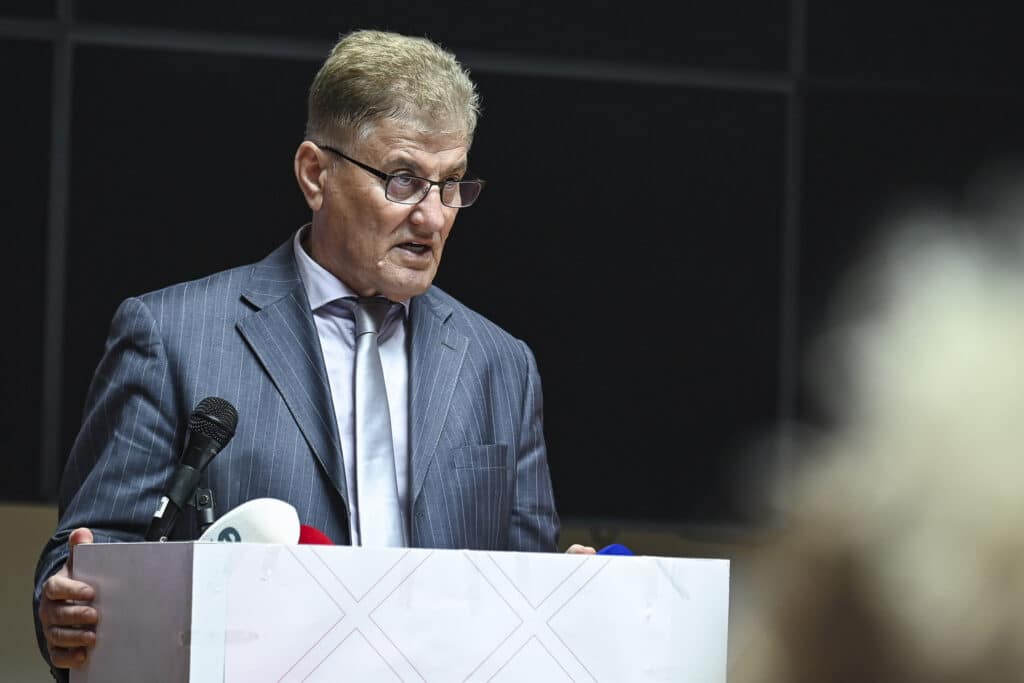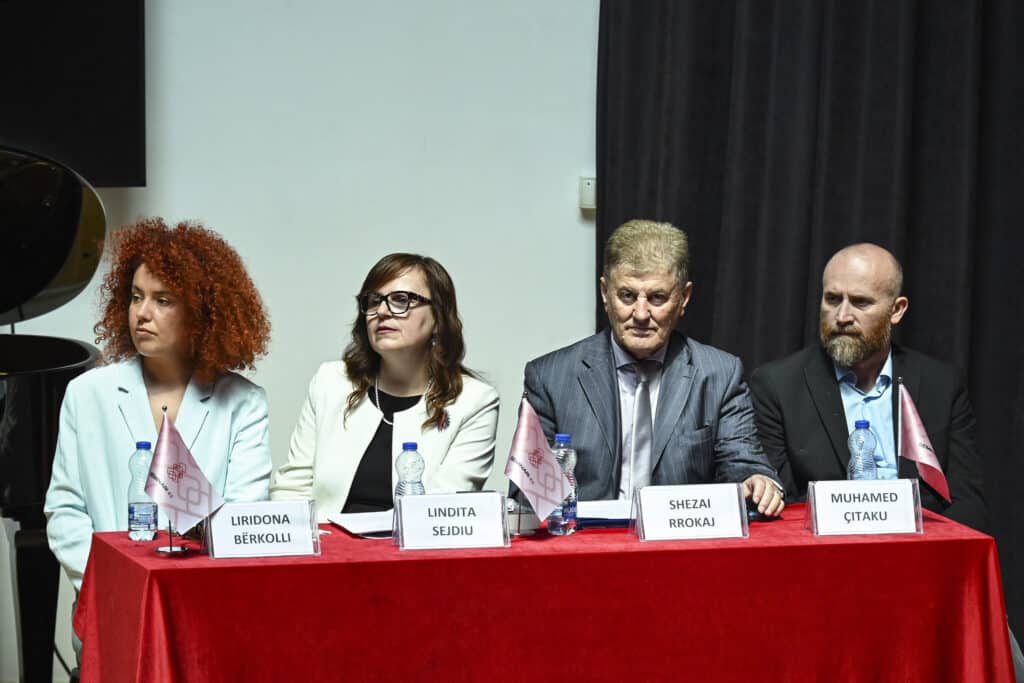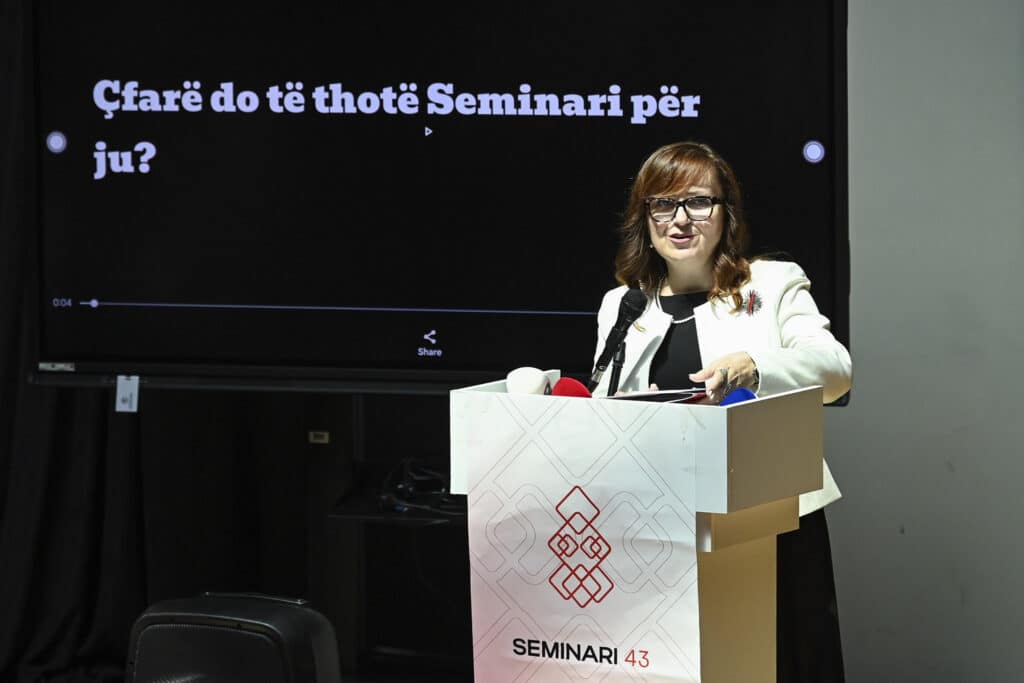Prishtina, August 18, 2025
The Acting Prime Minister of the Republic of Kosovo, Albin Kurti, participated in the solemn opening of the 43rd International Seminar on Albanian Language, Literature, and Culture, held at the Amphitheater of the University Library of Kosovo – Institute of History.
Before a large audience including academics, scientists, professors, seminar leaders, seminar participants, and students, in his opening speech, the Prime Minister emphasized that in the cultural life calendar of Kosovo, the Seminar is the longest-standing cultural event. He also highlighted that, just as in previous years, he is pleased to attend the opening of its 43rd edition this year.
“Many researchers, scientists, and academics, who bring the knowledge and experiences of their language, will speak here about the language of Albanian culture and the culture of the Albanian language. I always adhere to the statement I made at the seminar’s opening here four years ago, when I stressed that the inseparable intimacy of the relationship between thought and language will always remain a matter for humanity, and thus for our cultural formation. Culture itself is this timeless and eternal inseparability,” said Prime Minister Kurti.
He continued: “Every international seminar on language, including this 43rd seminar, plays a significant role in the most important calculation of the foundation that serves thought, even conditioning it. Because, as we know, in the relationship between thought and language, enabling and conditioning come and intertwine. In a way, linguistic study focuses on calculating the rationality of the genuine mode of thought. Language is not only the communication of needs, but above all the communication of subjectivity, memory, imagination, and culture—it is essential communication. In the context of the rapid development of artificial intelligence, language is the most solid foundation for preserving human and natural intelligence and imagination.”
Prime Minister Kurti underlined that the Ministry of Education, Science, Technology, and Innovation has taken important steps to strengthen and promote the Albanian language in Kosovo and the diaspora. According to him, this has been achieved through annual scholarships of 1000 euros for students of Albanian Language and Literature, support for academic staff, as well as cooperation with Albania for the preparation of unified textbooks for Albanian students abroad. He added that the tradition of competitions and the Albanian Language Olympiad for pre-university students has also been strengthened, encouraging spelling, reading, and critical thinking. For two consecutive years, the ministry has supported the International Seminar on Albanian Language, Literature, and Culture. Additionally, it has supported the Nationwide Diaspora Seminar, which connects educational institutions with Albanian communities abroad. Both Kosovo and Albania now have many outstanding students, excellent professors, and famous authors in the diaspora. These initiatives create a stable foundation for the preservation and development of the Albanian language, placing it at the center of education and our national identity.
“Our approach as a government is serious about protecting archaeological heritage. We have assigned special commitment to preserving and discovering the history of our people. And it seems to me that there is no more suitable place to speak about this than at this seminar dedicated to language, because we are above all a nation of language, our beautiful Albanian language. But our antiquity is also connected precisely to this fundamental feature, which is at the same time the essential factor of our antiquity itself,” said Prime Minister Kurti, wishing success to the international cooperation seminar on Albanian language, literature, and culture.
Full Speech of Prime Minister Kurti:
Honorable Ms. Arbërie Nagavci, Minister of Education, Science, Technology, and Innovation,
Honorable Mr. Arben Hajrullahu, Rector of the University of Prishtina,
Honorable Mr. Mentor Alishani, Rector of the University of Prizren,
Honorable Ms. Lindita Sejdiu, Director of the Seminar,
Honorable Mr. Mehmet Kraja, President of the Academy of Sciences and Arts of Kosovo,
Honorable Mr. Shezai Rrokaj, Co-Director of the Seminar,
Distinguished Ambassadors of the Republic of Albania, the Republic of Montenegro, Japan, diplomatic representatives from Croatia, Bulgaria, Greece, and,
Esteemed professors, academics, students,
Honored guests,
And above all, respected guests, enthusiasts and scholars of Albanology who have come for the 43rd edition of our Seminar, where together we live the present of our language, but also all the past institutionalized in this Seminar, which I believe will continue not only for many more years but for many decades, even centuries into the future.
In the calendar of Kosovo’s cultural life, precisely the International Seminar on Albanian Language, Literature, and Culture is the longest-standing cultural event—not by chance. Just as in previous years, this year I come with great pleasure to the 43rd edition of the Seminar. I simply say “Seminar” because for years in Prishtina if you say “Seminar,” it is known which seminar you mean—it is the Language Seminar at the University of Prishtina.
Many researchers, scientists, and academics, who come with the knowledge and experiences of their language, will speak here about the language of Albanian culture and the culture of the Albanian language. I always adhere to the statement I made at the seminar’s opening here four years ago, when I emphasized that the inseparable intimacy of the relationship between thought and language will always remain a matter for humanity, and thus also for our cultural formation. Culture itself is this persistent and eternal inseparability.
It is up to linguists to elaborate on this with all their sub-disciplines. Every international seminar on language, including this 43rd seminar, plays a great role in the crucial calculation of the base that serves thought, even conditioning it. Because, as we know, in the relationship between thought and language, enabling and conditioning come and intertwine. In a way, linguistic study focuses on calculating the rationality of the genuine way of thinking. Language is not only communication of needs, but above all communication of subjectivity, memory, imagination, and culture—it is essential communication. In the context of the rapid development of artificial intelligence, language is the most solid foundation for preserving human and natural intelligence and imagination.
I read the program of topics with great eagerness. Allow me to express my admiration for the breadth of the presentations planned for the coming days, for the participants who fill these days with multiple perspectives that make the Seminar comprehensive.
Allow me also to express myself, perhaps not so much as a Prime Minister but as a citizen who is deeply fascinated by the scholarly and specific work of each scientist present here. From the position of a citizen born and living in the Albanian language, who works and thinks in this language, I take the opportunity to express my emotion and fascination in an enumeration, of course with some gaps.
All presentations are certainly of special interest. They inspire the desire to listen and follow their content and results. Not all of us are lucky enough to be linguists and deal with the living organization of language. I saw that the panels conceptualized by you range from our poets, as proclaimers of the language, to the dynamization of language across regions, as the power preserving our dialects over time. From the study of expressions and symbolism, from songs and rituals to the movement of language in disciplinary terminologies, or even missing terminologies—another interesting and very useful landscape. From the nurturing of language among our diaspora, to connections between language and politics and the intersections of myth and history, and other dimensions of scholarly work. The reintroduction of problems held by folklore and ballads, or the ethno-musical heritage of Albanian women and children’s games, other sources of reflection on the dynamics of language and meaning.
Forgive me for the comparison with the biology of living beings, if I may say so, but in the entirety of the planned panels and lectures, language is presented as a living organism breathing in every corner, function, and time, pulsating everywhere. Because here are mentioned regions and ages, times and events, personalities and poetic and prose data of the language—language in its vitality and history. Equally, the idea of the organism in a diverse environment is conveyed. Language in its own ecosystem, with the assimilation of foreign terms in new situations, with a targeted or even damaged metabolism, and with a syntax we know to be as strong as that of our Albanian. A language has its own ecology: whether proto-Albanian, southern Tosk, old Gheg Albanian, or standard Albanian—all states constitute dimensions from which the power of a language can be drawn infinitely, even if we are not fully aware. Because as Ferdinand de Saussure said, language constantly changes, but you cannot change it. Thus, there can be no author of progress implying change. Language as an organism that organizes. Perhaps this can be called at least my fascination.
Other panels continue with reflections on borrowings and word formations, even terminology of Artificial Intelligence. I also saw that you will bring extraordinary evidence related to old recordings of songs, the imagining of Lekë Dukagjini’s Kanun in Italy, Albanian in early foreign perspectives, and narratives about Albanian independence in the Italian press. Interconnections between modernism and aesthetics, between ideology and literature, go as far as characters and texts of some of our contemporary novels. Only as a great transformer of perception, only as such, language can result in the creation of layers of culture, of the entire culture, which we live, experience, not only consume or study.
Whatever our social and state wealth, our enthusiasm for our Albanian language, in our culture, arts, and sciences must only increase. As Prime Minister, I express my readiness to support institutions directly connected to this noble purpose and historic duty.
For me, the most profound sentences about language were outlined in the first half of the 20th century by two German-speaking authors: Ludwig Wittgenstein with his expression that “the limits of my language mean the limits of my world”; and Martin Heidegger when he wrote that “being dwells in language.” As a politician, I know very well how important borders are for both sides and how much care must be taken for the space where we live, not only in the time we live in.
Dear participants,
Our Ministry of Education, Science, Technology, and Innovation has taken important steps to strengthen and promote the Albanian language in Kosovo and in the diaspora. This has been achieved through: annual scholarships for students of Albanian Language and Literature amounting to 1000 euros and support for academic staff, as well as cooperation with the Republic of Albania for the preparation of unified textbooks for Albanian students abroad.
Furthermore, the tradition of competitions and the Albanian Language Olympiad for pre-university students has been strengthened, encouraging spelling, reading, and critical thinking. For two consecutive years, the ministry has also supported the International Seminar on Albanian Language, Literature, and Culture. Alongside this, it has supported the Pan-Albanian Diaspora Seminar, which connects educational institutions with Albanian communities abroad. We already have many distinguished students, excellent professors, and famous authors in the diaspora, both from Kosovo and Albania, who are becoming increasingly renowned. These initiatives create a sustainable foundation for the preservation and development of the Albanian language, placing it at the center of our education and national identity.
Our approach as a government is also serious in protecting archaeological heritage. We have given it special dedication in preserving and uncovering the history of our people. I find no more fitting place to speak about this than at this seminar dedicated to language, because above all, we are a nation of language—of our beautiful Albanian language. But our antiquity is also connected precisely to this fundamental feature of ours, which at the same time is an essential factor of our antiquity itself.
This is also evidenced by one of the most important archaeological discoveries in Kosovo, in the archaeological site of Ulpiana, near Prishtina, where a team of archaeologists from Kosovo and France uncovered two rare inscriptions of Emperor Justinian and his wife, Theodora, from the mid-6th century. One mentions the founding of the city of Iustiniana Secunda as a Dardanian city, while the other attests to the construction of the episcopal basilica. These are the only known dedications of Justinian that confirm his connection to Dardania and the importance of Ulpiana in late antiquity and early medieval times. We will continue with technical, scientific, and financial support, deepening international cooperation and establishing new ones to further uncover and protect the history of Kosovo.
Dear researchers and linguists, professors and students,
I wish you success in this seminar of international cooperation on Albanian language, literature, and culture. I congratulate you with admiration for this seminar, which represents a wonderful tradition of meetings among scholars in these diverse fields, all nourished by our language and in our language.
Thank you.
